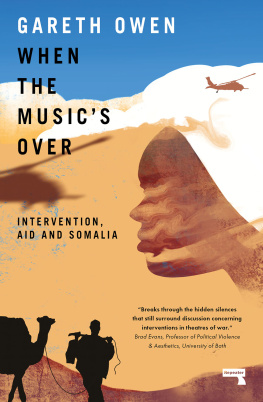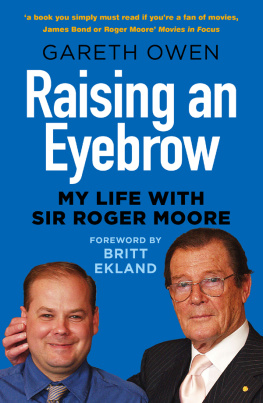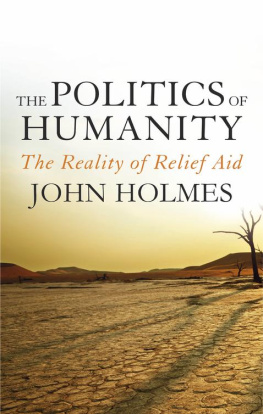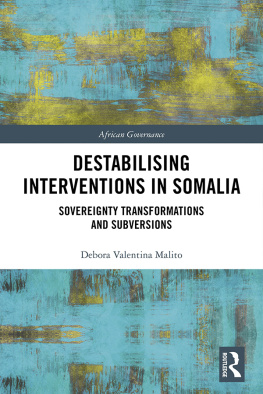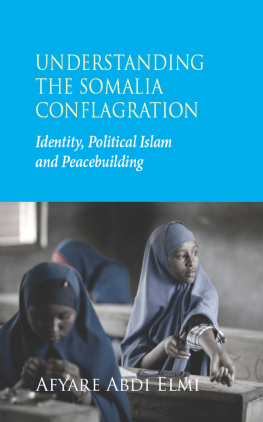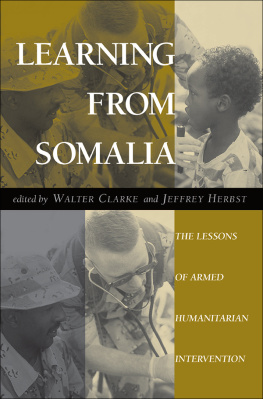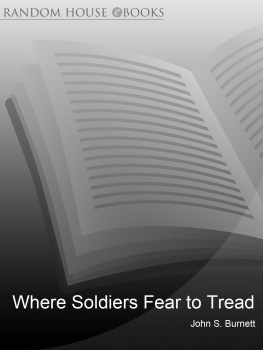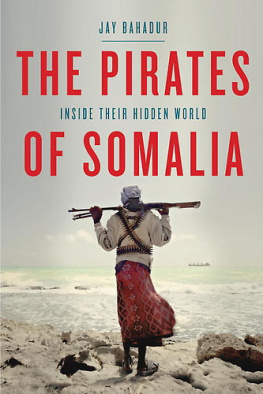
When the Musics Over pauses, then breaks through the hidden silences that still surround discussion concerning interventions in theatres of war. Gareth Owen writes with an honesty, sensitivity and critical self-reflection, which is often missing in books of this kind. In doing so, he brings a new kind of tragic and yet learned music that puts the human back into the humanitarian. Highly recommended.
B RAD E VANS , P ROFESSOR OF P OLITICAL V IOLENCE & A ESTHETICS , U NIVERSITY OF B ATH
Gareth Owen has rendered the intrinsic dilemmas, moral ambiguities and political hazards of humanitarianism in a powerful and poignant personal memoir of his time in Somalia. His writing exudes the sense of shared humanity that his profession should be anchored in. It is also a salutary warning of what may happen to NGOs, the UN and donor governments when they lose sight of that fact.
A NDREW T HOMPSON , P ROFESSOR OF G LOBAL AND I MPERIAL H ISTORY , N UFFIELD C OLLEGE , U NIVERSITY OF O XFORD


Published by Repeater Books
An imprint of Watkins Media Ltd
Unit 11 Shepperton House
89-93 Shepperton Road
London
N1 3DF
United Kingdom
www.repeaterbooks.com
A Repeater Books paperback original 2022
Distributed in the United States by Random House, Inc., New York.
Copyright Gareth Owen 2022
Gareth Owen asserts the moral right to be identified as the author of this work.
ISBN: 9781914420436
Ebook ISBN: 9781914420443
All rights reserved. No part of this publication may be reproduced, stored in a retrieval system, or transmitted, in any form or by any means, electronic, mechanical, photocopying, recording or otherwise, without the prior permission of the publishers.
This book is sold subject to the condition that it shall not, by way of trade or otherwise, be lent, re-sold, hired out or otherwise circulated without the publishers prior consent in any form of binding or cover other than that in which it is published and without a similar condition including this condition being imposed on the subsequent purchaser.

Printed and bound in the United Kingdom by TJ International Ltd
In Loving Memory of Alice Jane Owen
CONTENTS
PREFACE
Do as much as you can, as well as you can, for as many as you can, for as long as you can.
Father Aengus Finucane, C.S.Sp.
Soldiers and civilians dont tend to mix well, but when thrown together in highly unusual circumstances, alongside the inevitable enmities, unlikely partnerships and genuine friendships can develop. I had no idea I would be spending so much time in the company of foreign militaries when I embarked on a career in humanitarian aid. Nor did I realise that the beginning of my professional life would coincide with the start of a unique period in modern international relations. My ignorance of such matters was near total when I was sent to Somalia in 1993, one of the most notorious humanitarian operations in history.
Humanitarian endeavour is best characterised as the saving of lives and relief of human suffering during times of extreme crisis. Actions fuelled by hope, often courageous and sometimes foolhardy, are undertaken in accordance with a unifying foundational belief in common humanity and respect for human dignity. Such belief binds a global community of national and international organisations. Their origins and mandates differ, but they form a network of emotional and philosophical human connection, of solidarity with the most marginalised and deprived who inevitably suffer at the hands of the powerful in lifes constant struggle. In taking direct action to preserve life and relieve human suffering, humanitarians aim to counter the worst effects of an unfair world. As such, they inevitably find themselves operating in extreme situations where their own lives may also be at risk. Indeed, humanitarian work ranks among the worlds most dangerous professions. Humanitarians are mostly the ordinary folk of communities affected by crisis, whose efforts to help themselves and each other are supplemented by a transient gathering of internationalists with diverse ideologies, drawn together in shared altruistic purpose.
Humanitarian action is never more contentious than when it is invoked by powerful states as ethical justification for military intervention. This was the case in Somalia in December 1992, when the US military led an international response to a terrible famine brought on by civil war. Civilian humanitarian workers, both Somali and international, found themselves rubbing shoulders with a coalition of foreign soldiers comprising many nationalities, authorised to use all necessary means to establish as soon as possible a secure environment for humanitarian relief operations. Mandating the use of force for ethical purposes was unusual and open to wide interpretation. These were complex circumstances that led to much friction, but also to a strange symbiosis. It was a world of dilemmas where bad decisions by bad leaders ultimately allowed the authorised use of force to be sorely abused. If the extraordinary resistance of ordinary Somalis was ultimately victorious over a foreign invasion aimed at liberal ordering and legitimised by good intentions, it was the vanquished American military and the failings of a sullied United Nations that ultimately wrote its history.
In the years that followed the end of the Cold War, multiple foreign operations were championed by Western nations in the name of humanity and safeguarding of rights. For many observers such actions were an unwelcome manifestation of Americas hubristic imperial influence. It seemed powerful nations in the West only intervened when it suited their interests. There had to be ulterior motives for sending thirty thousand soldiers to Somalia perhaps the imposition of rules-based order, the undermining of sovereignty or securing of access to valuable resources. It couldnt just be promotion of liberal values on the supposedly illiberal other, even when the motives espoused were humanitarian and the intervention mandated by The United Nations Security Council. International involvement of this kind in civil wars and ethnic conflicts was fraught with many dangers, both physical and moral. Such action was certain to be derided as the heavy-handed and hypocritical moralising of powerful nations.
George H.W. Bush was sworn in as the forty-first President of the United States in January 1989, replacing Ronald Reagan, who in tandem with Margaret Thatcher had championed the neoliberal counterrevolution, hammering shut the coffin lid on the Keynesian post-war consensus of universal employment and welfare. Darwinian competitiveness and slavish adherence to market forces in the pursuit of freedom would become articles of utopian, millenarian faith in Western liberal democracies. Bushs inaugural year ended with the collapse of the Berlin Wall, beginning a new epoch in humanitarian history.
As civil war raged in Somalia, an unsuccessful coup against Mikhail Gorbachev in August 1991 sealed the fate of the Soviet Union and the hammer and sickle was lowered over the Kremlin for the final time on Christmas Day. The Cold War that had poured so much fuel on the flames of Somalias burning fire was finally won. President Bush could gaze out from the Oval Office as Commander-in-Chief, not just of the United States of America, but of a New World Order in which the sacred tenets of liberal democracy free market capitalism, individual rights and freedoms, political power limited by the rule of law could be promoted unchallenged. Humanitarianism was an ideal tool for liberal democracies global public relations. Military campaigns would even be referred to as Humanitarian Intervention.
Next page
